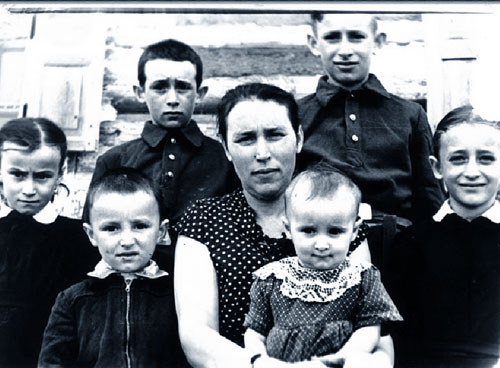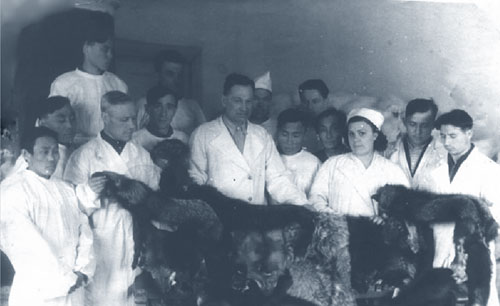









Born in 1926 in the village of Grimm, ASSR of the Volga-Germans. Deported to the Krasnoyarsk Territory in 1941. Spent the time of special (forced) resettlement in the Taimyr Region as from 1942. Fisherman and hunter. He now lives in Potapovo.
- I was thirteen when they came to arrest my father. This happened two years before the outbreak of war. Father was working for the kolkhos farm; it was his job to control the instrument panel. Some more men were arrested together with him. They were all sentenced on Article 58 – enemies of the people.
My mother, Yelizaveta (Elisabeth) Schefer worked as a milkmaid and tiller, while I herded animals and drove the harvester on vegetable plantations.
We lived in a big village with 13.000 inhabitants, and there even was a dairy.
In September 1941 they begann to deport all Germans. I do recall the heartbreaking roar of the cattle the people had to leave behind. In search of their master, cows and goats were meandering through the village. They even went into the houses, since most of the entrance doors had been left wide open. And those people who had not yet left their homes, took pity on the poor animals and posthaste milked the cows for the very last time – and all the milk was running right onto the ground. In September 1941 mother and I arrived in the village of Reshoty, Nizhne-Ingashsk District, Krasnoyarsk Territory. The labour army was operating in this place; we were to work for the kolkhoz farm.
One year later the deported us for the second time: we were to work in the Far North. We came to a small settlement called Ust-Khantaika in the Dudinka District. They said that we would have to stay there für a period of about 5-6 months, but it later turned out that we would not be able to leave the place for a long time. Several families lived in the settlement: the Mirgunovs, Chirkovs and Grischkos. However, as soon as we arrived, they were all transferred to the settlement of Potapovo.
After the first winter just 180 out of primarily 450 special resettlers were still alive. The rest had died from scurvy, hunger or – because they had not managed to getting used to the rough climate. Our mother was bedridden for a whole year, she was unable to get up from her plank bed, but she survived.
In Khantaika we went fishing. During the war their was a wide-spread slogan: „Fisherman, remember the following: the more fish you catch, the more fish we can supply our soldiers with!“ It would often happen that we had to work 24 hours without any break. We did not eat fish ourselves – the entire catch was sent to the front.
In the course of time I became quite a good fisherman and hunter. I learned how to put up traps and use gin traps in order to catch arctic foxes. I prefer to hunt for partridges. Late in the 1950s I removed with my family to Potapovo. For fifteen years in succession I was the best from among the fishermen in Potapovo.
But I received the first certificate only in 1955 ...
In the settlement their also lived a number of Finns and Letts. The Finns were very good at gathering mushrooms. In 1956 almost everybody left the place, just the Germans stayed to live there....
Recorded in Potapovo in 1992


Department of Culture and Art of the Administration of the Taimyr Region (Dolganes
/ Nenzes)
Museum of Local Lore of the Autonomous Taimyr Region.
„Museum Messenger“. Issue 1.
Dudinka, 2001